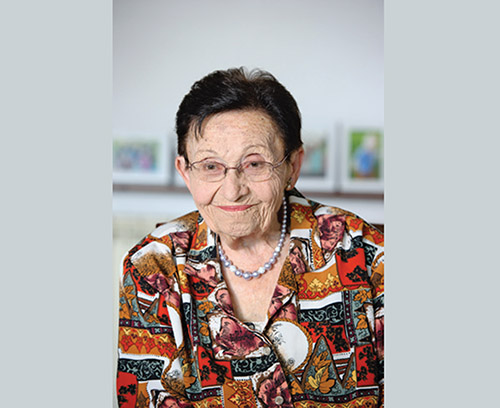
During the next month, Israel will be enveloped by a flurry of observances ranging from the solemn Yom Hazikaron (Memorial Day) ceremonies to the festive 69th Yom Ha’atzmaut (Israel Independence Day) and 50th anniversary of the Six-Day War/Reunification of Jerusalem celebrations.
For the widows of Israel’s fallen soldiers, who paid the ultimate price so that Jews all over the world could revel in the modern-day rebirth of the Jewish State, these anniversaries stir a torrent of varying emotions.
At 94 years old, Devorah Arkin Roth is one of the country’s oldest living war widows. Her husband Mordechai Arkin was killed while defending Hadassah Hospital in Jerusalem just weeks before the official outbreak of the War of Independence in May 1948. She still clings to the fond memories of her husband, as she stares at the photo album of their wedding and the newborn pictures of their first child. “He was a very talented man who wanted to go to Columbia University in New York to study physics,” Devorah recalled. “But the deteriorating security situation in the country wouldn’t permit him to leave. He worked at Hadassah Hospital and doubled as a guard when he was killed. At the time of his death, I was already pregnant with our second child.”
Though Devorah remarried and has been privileged to be a mother, grandmother and great-grandmother, she still gets the jitters each time one of her grandchildren goes into the army. “It’s difficult to see your grandchildren being drafted into the IDF after what I had to endure and even more so because one of my grandchildren was injured as well in battle,” she recollected.
Nineteen years after Israel’s independence, the Six-Dar War was as an astounding military accomplishment of Biblical proportions, as the IDF smashed the massive armed forces of Egypt, Syria and Jordan. But, 776 IDF soldiers lost their lives in the midst of liberating Jerusalem, the Golan Heights and Judea and Samaria.
Private Yossi Mori was killed on the first day of the Six-Day Way (June 5) after his unit was shelled in a minefield. His widow, Dania, recalled, “We had a great group of friends and to this day, we meet every Memorial Day at his grave. During these years, you keep going, building your home, raising children and grandchildren. You don’t just sit all day thinking about your loss, because then your life would stop.”
First Lieutenant Yehuda Ram died while liberating the Golan Heights on the last and sixth day of the war (June 10). “Yehuda died when he was 23 years old and we had only been married for a year. It was young love, an innocent one,” his widow, Shoshana, fondly remembered. “I actually came back from the war filled with guilt. Why did I survive and he didn’t? Those feelings disappeared with the years because you can’t keep living like that.”
Even in between wars, when IDF soldiers constantly train in order to be ready for the next conflagration, there are inherent dangers, which can exact a toll.
Like a thunderbolt out of the blue, Sara Omer’s world was nearly destroyed in 2008, when her husband Reuven was killed in the midst of a training exercise as part of his IDF reserve duty. Sara had to face life alone with her three young boys, twins Nadav and Yotam, who were 6 years old, and Guy, then 2 years old.
Sara, armed with typical British optimism and steely resolve, refused to let her world come apart at the seams. “The unexpected loss of my husband was indeed shocking and when Yom Hazikaron (Memorial Day) comes around every year, it is a difficult day for all of the widows, but my children, who are now teenagers, attend a special ceremony at the Knesset, which is both uplifting and inspiring,” she said.
For the soldiers who paid the ultimate sacrifice for the State of Israel, those they left behind have suffered the most. But the widows of the IDF never stand alone. While the entire Jewish people hold them in their hearts, the widows themselves band together to give each other mutual support, both emotional and physical. Run for widows and orphans by widows and orphans, the IDFWO (IDF Widows and Orphans Organization) creates a support network to help them through difficult times. The organization provides services that touch every aspect of their lives, from a touching communal Bar/Bat mitzvah service at the Kotel, to professional training courses for widows.
One of the most important aspects of the IDFWO activities is the power to bring together people with common experiences for mutual support. Regular retreats give widows a welcome break and a chance to benefit from mutual understanding. The IDFWO Otzma Camps also give orphans the same opportunity.
“Once a war widow, always a war widow, even if you remarry and love your second husband. The IDFWO gatherings and activities are very important for a very specific reason,” one of the widows explained. “We might not always agree with each other’s opinions about different things, but we all speak the same language and understand each other, as widows. Since we have all experienced the same loss and trauma, we can speak to each other in our language and help each other when we need to, especially on Yom Hazikaron, when we all could use a hug and a smile.”
Even as the official mourning of Yom Hazikaron ends, and the rest of the country moves to the happiness of Yom Ha’atzmaut, these women will find comfort in each other to face their common struggles.
To learn more about the IDFWO and show your support for the IDF fallen, please visit www.idfwo.org/eng.
By Ken Stephens













